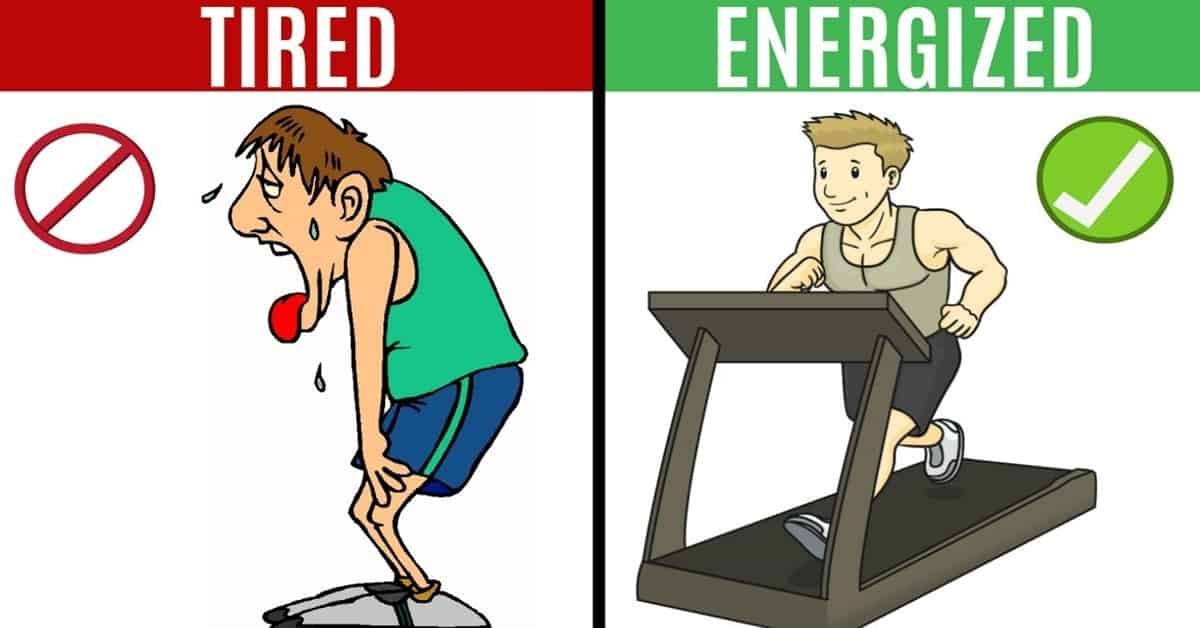Feeling energetic and maintaining vitality can significantly improve daily life, productivity, and overall well-being. Here are 20+ natural ways to boost your energy levels:
1. Stay Hydrated
- Drink plenty of water throughout the day. Dehydration can lead to fatigue, so aim for at least 8 glasses.
2. Eat a Balanced Diet
- Incorporate a variety of foods: fruits, vegetables, whole grains, lean proteins, and healthy fats into your meals for sustained energy.
3. Regular Exercise
- Engage in regular physical activity, such as walking, jogging, yoga, or dancing. Exercise boosts endorphins and improves blood circulation.
4. Get Enough Sleep
- Aim for 7-9 hours of quality sleep each night. Establish a consistent sleep schedule to enhance sleep quality.
5. Limit Caffeine Intake
- While moderate caffeine can provide a quick boost, excessive consumption can lead to energy crashes. Opt for green tea for a gentler alternative.
6. Practice Mindfulness or Meditation
- Mindfulness practices can reduce stress and enhance mental clarity. Even a few minutes of meditation can re-energize your mind.
7. Take Short Breaks
- Incorporate regular breaks during work or study sessions. Brief pauses can help recharge your focus and productivity.
8. Get Sunlight
- Spend time outdoors in natural sunlight. Sunlight helps regulate circadian rhythms and boosts mood and energy.
9. Manage Stress
- Engage in stress-reducing activities such as yoga, deep breathing exercises, or hobbies to prevent burnout and fatigue.
10. Eat Smaller, Frequent Meals
- Instead of large meals, try having smaller, nutrient-dense meals throughout the day to maintain a steady energy supply.
11. Consume Complex Carbohydrates
- Foods like oats, quinoa, and brown rice provide sustained energy compared to simple sugars that can lead to crashes.
12. Incorporate Protein-Rich Foods
- Include sources of protein in your meals—like eggs, legumes, and nuts—which can help keep you full and energized.
13. Limit Processed Foods and Sugars
- Reduce your intake of sugar-laden snacks and processed foods, as they can lead to energy spikes and subsequent crashes.
14. Practice Deep Breathing
- Deep breathing exercises can increase oxygen flow and reduce fatigue, helping rejuvenate both your body and mind.
15. Listen to Upbeat Music
- Music can uplift your mood and increase your energy. Create a playlist of your favorite energetic songs.
16. Stay Socially Engaged
- Spend time with friends or loved ones. Positive social interactions can boost your mood and energy levels.
17. Try Power Naps
- A short nap (10-20 minutes) can recharge your energy without making you feel groggy.
18. Cut Down on Alcohol
- Limiting alcohol consumption can improve sleep quality and prevent fatigue.
19. Stay Organized
- Keeping a tidy and organized environment can reduce stress and promote a more productive, energized mindset.
20. Have a Healthy Snack
- Snack on energy-boosting foods such as nuts, seeds, yogurt, or fruit instead of sugary treats to maintain energy levels.
21. Add Adaptogenic Herbs
- Include adaptogens like ashwagandha or rhodiola in your diet. These herbs may help combat fatigue and improve resilience to stress.
22. Laugh More
- Engage in activities that make you laugh, whether it’s watching a funny movie or spending time with friends. Laughter can enhance mood and energize.
Incorporating these natural strategies into your lifestyle can lead to improved energy levels and a greater sense of vitality.
Questions & Answers on Natural Energy Boosting
Here’s a list of questions and answers based on the natural ways to boost energy levels:
Q1: How important is hydration for maintaining energy levels?
A1: Staying hydrated is crucial for maintaining energy levels. Dehydration can lead to fatigue and decreased concentration, so it’s essential to drink plenty of water throughout the day, aiming for at least 8 glasses.
Q2: What type of diet is best for sustained energy?
A2: A balanced diet rich in fruits, vegetables, whole grains, lean proteins, and healthy fats provides the nutrients needed for sustained energy. Foods high in complex carbohydrates and protein are particularly beneficial.
Q3: How does regular exercise contribute to energy levels?
A3: Regular physical activity increases blood circulation and releases endorphins, which can boost mood and energy. Even short bursts of exercise can significantly enhance your overall vitality.
Q4: What are the effects of sleep on energy?
A4: Quality sleep is essential for restoring energy. Aim for 7-9 hours of restful sleep each night to help your body recover, improve mood, and increase alertness during the day.
Q5: Can caffeine actually decrease my energy levels?
A5: Yes, while moderate caffeine can provide a temporary energy boost, excessive intake can lead to energy crashes. Opting for lower-caffeine alternatives, such as green tea, may offer a gentler energy lift.
Q6: How can mindfulness or meditation help with energy?
A6: Mindfulness and meditation reduce stress levels and promote mental clarity. Even a few minutes of these practices can enhance focus and recharge your energy.
Q7: Why should I take breaks during work?
A7: Taking short, regular breaks helps prevent mental fatigue and maintains productivity. Brief pauses can refresh your mind and enhance your overall energy levels.
Q8: How can sunlight exposure affect my energy?
A8: Sunlight helps regulate your circadian rhythms and boosts the production of serotonin, a mood-enhancing hormone. Spending time outdoors can lift your mood and increase energy.
Q9: What role does diet play in managing energy levels throughout the day?
A9: Eating smaller, more frequent meals rather than large ones can help maintain steady energy levels. Incorporating complex carbohydrates and proteins helps prevent energy spikes and crashes.
Q10: How do deep breathing exercises contribute to energy?
A10: Deep breathing exercises increase oxygen flow to the brain and body, which can reduce fatigue and enhance focus, making you feel more energized.
Q11: Is listening to music really effective for boosting energy?
A11: Yes! Listening to upbeat music can uplift your mood and increase energy levels. Creating a playlist of energetic songs can enhance motivation and productivity.
Q12: Why is social interaction important for energy?
A12: Engaging with friends and loved ones can significantly boost your mood and energy. Positive social interactions release endorphins, leading to a greater sense of vitality.
Q13: How can short naps improve my energy?
A13: Power naps of 10-20 minutes can be energizing and help recharge your mind without causing grogginess. They can enhance alertness and improve mood.
Q14: What is the impact of alcohol on energy levels?
A14: Excessive alcohol consumption can disrupt sleep quality, leading to fatigue. Limiting alcohol intake can help improve overall energy levels.
Q15: How does keeping my environment organized affect my energy?
A15: An organized environment reduces stress and promotes a more productive mindset. A tidy space can help you feel more in control and energized throughout the day.
Q16: What are adaptogenic herbs, and how do they help?
A16: Adaptogenic herbs like ashwagandha and rhodiola help the body adapt to stress and may combat fatigue. These herbs support overall resilience and energy levels.
Q17: How can laughter contribute to my energy?
A17: Laughter triggers the release of endorphins, which enhances mood and can provide an immediate energy boost. Engaging in fun activities that make you laugh can keep your spirits high.


